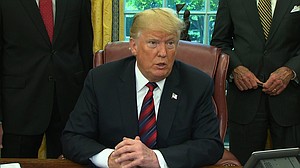11/12/2018

Analysis by Chris Cillizza, CNN Editor-at-large
(CNN) -- President Donald Trump spent the weekend in Paris, but his Twitter feed is evidence that he kept a close eye on events stateside -- most notably the ongoing recounts in Florida and the still-uncalled Senate race in Arizona.
"The Florida Election should be called in favor of Rick Scott and Ron DeSantis in that large numbers of new ballots showed up out of nowhere, and many ballots are missing or forged," tweeted Trump on Monday morning. "An honest vote count is no longer possible-ballots massively infected. Must go with Election Night!"
On Arizona's race between Reps. Kyrsten Sinema (D) and Martha McSally (R), Trump tweeted this: "Just out — in Arizona, SIGNATURES DON'T MATCH. Electoral corruption - Call for a new Election? We must protect our Democracy!"
Here's the thing: Nothing that Trump is alleging in these two tweets is accurate.
Florida is in the midst of an automatic machine recount that was triggered by the narrowness of the margins for both Scott (in the Senate race) and DeSantis (in the governor's race). Trump's allegation that "large numbers of new ballots showed up out of nowhere" is either a) a reference to the high-profile -- and misunderstood -- story of a teacher in Broward County finding a box labeled "provisional ballots" (the box contained office supplies and zero actual ballots) or b) Trump's misunderstanding (purposeful or not) that the original vote count in Broward County took longer than some other counties in the state. Either way, what Trump is alleging is not accurate -- or at least not accurate given all publicly available evidence.
In Arizona, it's similarly hard to figure out what Trump is even talking about. I believe his "SIGNATURES DON'T MATCH" claim is related to potential discrepancies between the signatures on mail-in ballots and those the state has on file for voters. In those instances where a clear discrepancy is found, a call is placed to the voter to ascertain if they were, in fact, the person who had voted. (This is a good explainer on the real story in Arizona.)
The point here is that in both circumstances, Trump is yelling "FRAUD" despite a decided lack of evidence to that end. What appears to be happening -- in both Florida and Arizona -- is that the election law is being followed. Is it a cumbersome process in both places? Absolutely! But that doesn't mean an election is being stolen from anyone. In fact, both Scott and DeSantis are still very likely to win -- as machine recounts very rarely produce huge vote flips, the sort of flips Democrats need to win those states. In Arizona, Sinema appears to be headed to a narrow but not razor-thin win. (Sinema is ahead by 1.5 percentage points with more than 2.1 million votes counted.)
Trump's approach is fact-free, yes. But that's nothing new.
What IS important, though, is what Trump's baseless claims about the Florida and Arizona races tell us about how he will approach his own re-election race in 2020.
We already know that Trump is simply unwilling and unable to accept that he doesn't win -- or isn't the best or the most popular or whatever -- in every single situation. To do that, he often makes things up like that he had the largest inauguration crowd ever or that 3 million to 5 million illegal votes were cast in the 2016 election. Or that the 2018 election was "very close to complete victory" for him and Republicans.
Now, fast forward to November 8 (or so) 2020. (The election is on November 3 in 2020.) And imagine that Trump has lost the White House as a result of a close loss -- a 1 percentage point margin -- in Florida. Is there ANY circumstance you can imagine where Trump doesn't claim fraud? Doesn't insist that the election is being stolen from him -- and, by extension, his supporters? Doesn't refuse to concede the race and instead seeks to invalidate the result?
I can't. Not based on a) what we know about Trump and b) how he has approached the aftermath of the elections in Florida and Arizona. (REMINDER: Republicans are VERY likely to win both the Senate race and governor's race in Florida.) And such an unwillingness by a outgoing president to acknowledge his defeat could have consequences well beyond what Trump has wrought with his many other false claims over the past three years.
It's not great to have the President claim that he would have won the popular vote if not for millions of illegal votes. But it doesn't change the underlying political reality: Trump is President because he won -- with no questions or asterisks -- the Electoral College vote, and that is the way we choose presidents.
It's a very different thing if the President of the United States is defeated and refuses to acknowledge that fact because, well, he is incapable of seeing the damage he is doing to the peaceful transfer of power that makes American democracy a beacon of hope around the globe. An unwillingness to concede -- coupled with the likelihood that Trump would argue that the whole process had been rigged against him -- could create a major crisis, particularly given the unquestioning loyalty his supporters have shown for him in the first two years of his tenure.
Now, this all could be a moot point if Trump wins a second term. But at the moment, Trump's approval numbers suggest he will face a very serious fight for another four years -- and he could very well lose. And that's when the irresistible force runs into the unmovable object: A documented loss on the one hand, Trump's unwillingness to acknowledge defeat on the other.
That would not end well -- for democracy.
CORRECTION: This story's headline has been updated to correctly refer to the Senate race in Arizona.
